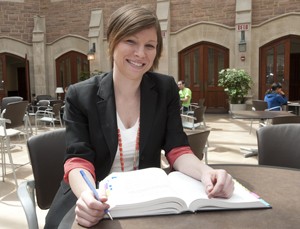
Adrian “Addie” Smith has spent much of her life searching for the right spot to focus her enthusiasm for building a brighter future for disadvantaged children.
And she appears to have found it. After graduation May 18, she will become a government affairs associate at the National Indian Child Welfare Association (NICWA), a nonprofit that lobbies on behalf of American Indian and Alaska Native children and directly supports tribal sovereignty and child welfare systems.
She’s looking forward to pushing for changes in policies that have often failed to meet the needs of these families.
“I’ve always wanted a career that would allow me to help children, but trying to do the right thing for people at the individual level can be very frustrating,” Smith says.
“You might get a child out of a dangerous situation or put an abuser in prison, but, at the end of the day, it can seem as though you’ve done nothing to fix the real problems that plague these families,” she says.
“I realized the only way to make a real difference is to focus on big-picture systems change.”
Before coming to Washington University in St. Louis, Smith earned a bachelor’s degree in psychology from Boston College in 2006. She spent two more years there working with women with severe Anorexia Nervosa and as a research coordinator on a National Institute of Mental Health grant before realizing she needed a new direction.
Smith’s time at WUSTL has been a whirlwind. She began with a rigorous first year in the School of Law, followed by an internship in the family violence unit of a Denver prosecutor’s office. In her second year, she took a course on American Indian law with Steven J. Gunn, JD, an adjunct professor of law, who works closely with tribes on sovereignty and other legal issues.
Smith, who had briefly lived on an Indian reservation as an undergraduate, quickly became immersed in the class. “I loved the professor,” Smith says. “He really encouraged me to consider working on American Indian issues.”
Gunn helped Smith land an internship with the Council for Native Hawaiian Advancement in Honolulu, where she co-wrote briefings and other policy tools on minority small business programs and other uniquely Native Hawaiian issues (and learned to surf in her spare time). She spent her third summer in Portland in a practicum with NICWA.
Along the way, she has squeezed in stints as a deputy juvenile delinquency officer with St. Louis County Family Courts; as a research assistant to law professor Susan Appleton, JD; and as a visiting teacher for a legal issues class at a local high school.
Smith also counsels her classmates on effective case briefings, information synthesis and time management.
“She is amazing,” says Elizabeth Walsh, assistant dean for student affairs in the School of Law.
This summer, after graduating with dual professional degrees in law and social work, she’s bound for NICWA, which is based in Portland, Ore.
“I’ll be doing national child welfare policy. Policy work is a really good fit for the skills I have gained as a dual (JD/MSW) degree student.
“Policy brings together the analytical skills that necessary to law and the big-picture understanding that comes from practicing social work — the policy nexus of the two degrees is really obvious when the topics are social welfare and systemic oppression.”
She’s also looking forward to hiking in the Pacific Northwest. She has hiked the Haleakala Crater in East Maui. She has clambered up rocks and through meadows in Chautauqua Park near Boulder, Colo. Odds are, she’s planning a return trip up Lookout Mountain when she finds time away from her new job.
“I love to hike, and that’s part of the reason I chose Denver, Honolulu and Portland for my internships,” Smith says.